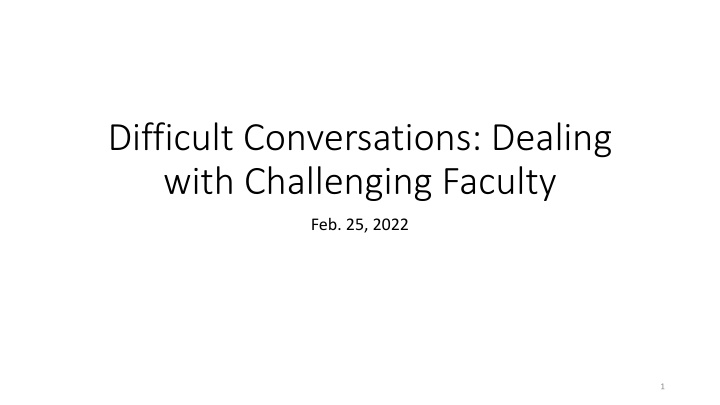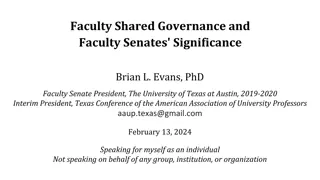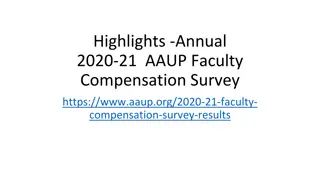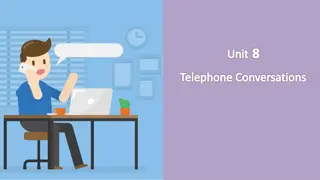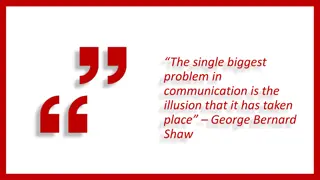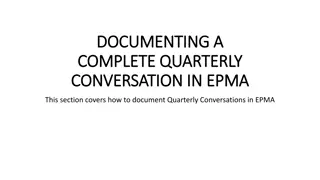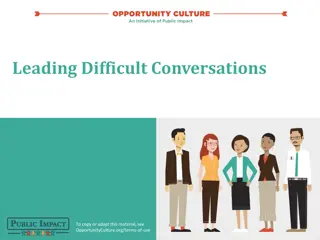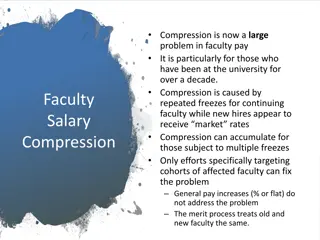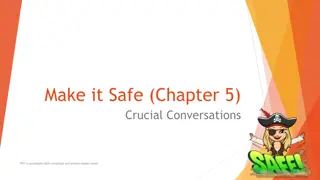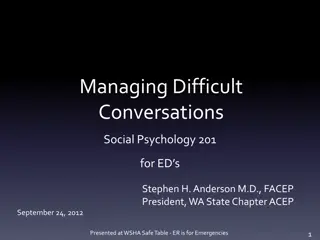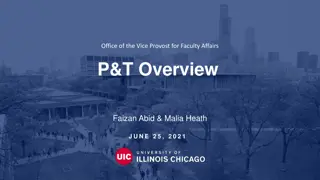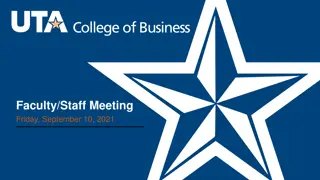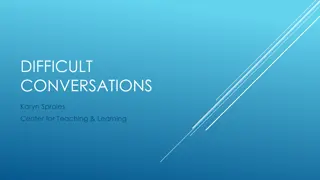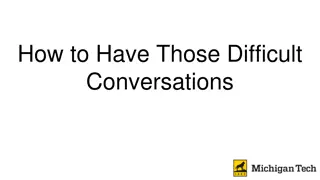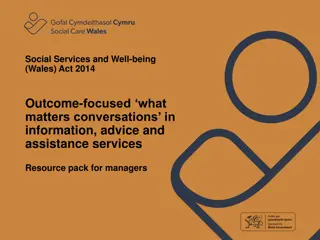Managing Challenging Faculty Conversations
Strategies for handling difficult conversations with faculty members, including identifying challenging scenarios, reasons for difficulty, problem faculty categories, performance issues, and practical steps to address conflicts effectively.
Download Presentation

Please find below an Image/Link to download the presentation.
The content on the website is provided AS IS for your information and personal use only. It may not be sold, licensed, or shared on other websites without obtaining consent from the author.If you encounter any issues during the download, it is possible that the publisher has removed the file from their server.
You are allowed to download the files provided on this website for personal or commercial use, subject to the condition that they are used lawfully. All files are the property of their respective owners.
The content on the website is provided AS IS for your information and personal use only. It may not be sold, licensed, or shared on other websites without obtaining consent from the author.
E N D
Presentation Transcript
Difficult Conversations: Dealing with Challenging Faculty Feb. 25, 2022 1
What kinds of conversations are difficult? Workload Not meeting expectations Student complaints about faculty Defensiveness Interprofessional relationships 2
What kinds of conversations are difficult? Delivering bad news Correcting poor performance or bad behavior When change is necessary Providing critical feedback Admitting mistakes 3
Why are these conversations difficult? Emotion Nobody likes criticism Culture Lack of accountability Little administrative support Fear Confrontation/conflict Material loss Loss of reputation or status 4
Problem faculty categories Complainers Procrastinators Prima donnas Confrontation junkies Underperformers Early retirement mode Mental illness Narcissism People with unhappy lives Bullies Passive-aggressive Afraid of change Leave me alone to do my job/lone wolves Intolerant of others 5
Problem categories Performance Teaching issues Unrealistic expectations No/too little scholarship No/too little service Bad advising Behavior Bullying Belligerence Passivity Attitude/whining Harassment Not a team player Lack of responsiveness Self-righteousness/sense of superiority 6
Performance Formula (David Whetten) Performance = Expectations x Ability x Motivation/Consequences 1. Are your expectations clear? 2. Do the faculty have the skills/ability to perform the job? 3. Are the consequences (positive or negative) applied consistently and fairly? 7
The 6 Steps (R. Kent Crookston) 1. Clarify values and expectations 2. Follow policy and document everything 3. Build trust with colleagues 4. Evaluate yourself and your perceptions 5. Listen 6. Take effective action LAW 8
Clarify values and expectations Anna had just been named department chair. Walter was a senior faculty member with a national reputation for scholarship in his field. In a department meeting, Walter used ridicule and sarcasm to belittle a colleague who proposed a modification to the curriculum. Nobody stood up to him. Everyone just kind of looked at the floor or at their notepads. This was common behavior on Walter s part. When Anna checked Walter's personnel file, she found nothing in writing about his behavior. 9
Walter: What went wrong? Nobody had ever called Walter on his behavior Now Anna has to address it 10
Follow Policy Blake was hired into the department and did well for a few years. However, the department chair (Tony) began to hear talk that Blake was boorish at times, offending female students with jokes and in-class comments. Several students stated this on the end of semester instructor evaluations. Tony considered bringing it up during the annual faculty evaluation meeting, but decided to let it go. He gave Blake a positive review. 11
Follow Policy During Blake s third year, several students came to Tony s office to tell him that Blake was often late to class and was not returning their graded assignments for many weeks after they were turned in. They also stated that Blake often ranted about university policies he disagreed with during his classes. Tony spoke to Blake who loudly proclaimed that he was not being treated fairly and that students were overly sensitive and had too much power over the faculty. Tony again gave Blake a positive annual evaluation and promised to write a letter supporting his advancement in rank. 12
Follow policy When Blake disappeared for a week and did not attend any of his scheduled classes, the university terminated him. Blake sued the university, claiming breach of contract because his department chair (Tony) had consistently provided him with positive performance evaluations and promised to support his promotion. 13
Blake: What went wrong? Because Blake s file does not contain any documentation of earlier conversations or actions concerning the issues raised, it appears that he was never warned about the concerning behaviors Tony wanted to avoid tough conversations and to be friendly and supportive of his faculty member Tony did not follow the university s policy that annual faculty evaluations were to be accurate and truthful about actual faculty performance, and he failed to document Blake s behavior. This will likely cost the university $$$ 14
Whats needed? Clearly written policy and code of conduct Accurate feedback to faculty; while we want to be supportive, we must also be honest Written documentation of incidents, meetings, conversations 15
Create a departmental behavior code (Code of conduct) Created by, and voted on by, all department faculty members (give everyone multiple opportunities to revise, edit, contribute) A reflection of the values and beliefs of the department; a promise the group makes to one another Specific and concrete 16
Code of Collegiality example (anonymous university) Superior: actively promotes courtesy and harmony, politely takes a stand against incivility when it occurs, works for the good of the whole rather than personal gain or credit, is supportive of others, listens attentively, open and receptive to new ideas Successful: treats others with respect and courtesy, keeps private or sensitive information confidential, listens to others, disagrees without being disagreeable Unacceptable: ignores or violates behavioral norms or policies, arrogant and condescending, treats others as inferiors, interrupts others, threatens, degrades, insults or ignores others 17
Department Expectations: BYU example Attend meetings Arrive on time Come prepared Follow though with all assignments Be open to new ideas Assume positive intent Avoid side conversations Avoid sarcasm Seek to understand differences though dialog and discussion 18
Code of Conduct Together, identify your values and clarify behavioral norms and expectations for everyone Revise, celebrate and uphold what you identify Use the norms/code/value statements as a standard against which you evaluate behavior and performance 19
Policy Know where to locate relevant policies; create them for your department if needed Where policies exist, follow them scrupulously Document all conversations, meetings, and decisions Make exceptions very judiciously; be aware of the possibility of favoritism, discrimination and setting precedent 20
What if: There is no policy that addresses the situation? You are asked to make an exception to the existing policy? 21
The 6 Steps (R. Kent Crookson) 1. Clarify values and expectations 2. Follow policy and document everything 3. Build trust with colleagues 4. Evaluate yourself and your perceptions 5. Listen 6. Take effective action GOSPEL 22
Build trust & evaluate yourself & listen Hear everyone out; get the whole story Seek both factual and emotional truths Be open and transparent Evaluate your own biases and triggers Stay calm and ask questions Listen listen listen (but ban whining) 23
The 6 Steps (R. Kent Crookson) 1. Clarify values and expectations 2. Follow policy and document everything 3. Build trust with colleagues 4. Evaluate yourself and your perceptions 5. Listen 6. Take effective action ( The difficult conversation ) 24
Poor performance or troubling behavior cannot be ignored Be fair to others who are performing well and playing by the rules Follow your policy and/or code Faculty handbook, employee handbook, department code of values or behaviors Be transparent and candid with the faculty member Describe the gap between expectations and observed behavior/performance Explain the negative impact on students, other faculty, university mission, etc. Be clear about what must change, when it must change, what will happen if it does not change (performance improvement plan) 25
Taking effective action (the difficult conversation) After the department created and adopted a Department Code of Civility , Walter interrupted a junior colleague to criticize her proposal. His tirade included words like stupid , incompetent , crappy and disgusted . What should Anna do? 26
Act quickly Walter, that comment violates the civility agreement we have in this department. Would you please express your opinion in a manner that fits within our agreement? (If he does so, the meeting can continue but at the end, Anna must tell Walter to come to her office as soon as possible) If he does not do so, Anna should adjourn the meeting immediately and tell Walter to come to her office 27
The conversation Describe the gap between what happened and what was supposed to happen Walter, what you just said to Ellen was inappropriate. It was a personal attack and it violated our agreed-upon Code of Civility. Tell me about the gap between our expectations of one another and what you did. 28
When Walter defends himself or makes excuses: Explain the negative impact that the behavior has on others (students, colleagues, department s reputation, etc.) Remind Walter that complying with the department s code is not a suggestion; it s a requirement of his position Walter, we greatly value your experience and skills, but we also have to consider the cost of your conduct and the negative impact it has on our department climate and on your colleagues, especially Ellen. Civil behavior is a requirement, not a suggestion. 29
When Walter continues to argue: Remind him that there are consequences for how we choose to behave I am going to document this incident in your personnel file, and I will be writing a Performance Improvement Plan to ensure that you understand the consequences of your actions and your choices. I hope that this will not happen again. Follow up with Performance Improvement Plan stating consequences if behavior re-occurs 30
Zelda, your student ratings are consistently low. The comments state that students are not learning in your courses, and that you are often not present during scheduled office hours. We expect our faculty to be strong teachers who are available to help students. Tell me about the gap between this expectation and your performance. If Zelda makes excuses or deflects responsibility, she should be reminded that: Being an effective teacher who is responsive to students is a requirement, not a suggestion There are consequences for how we choose to behave We have to consider the negative impact of your classroom performance on our students and on our departmental climate and reputation Consequence: Performance improvement plan indicating timeline for progress toward improving teaching performance and accessibility; include resources provided to assist Zelda; if it is serious should include clear description of what will happen if improvement does not occur 31
Justin, yelling at a student is inappropriate. It was a personal attack and violated our department s code. Tell me about the gap between our expectations and what you did. If Justin tries to justify his behavior, he should be reminded that: Complying with the department s code of behavior is a requirement, not a suggestion There are consequences for how we choose to behave We have to consider the negative impact of your behavior on our students and on our departmental climate and reputation Consequence: Performance improvement plan indicating what will happen if there is another documented incident of incivility 32
Emily, you have not done any peer-reviewed scholarly work for the past 4 years; the faculty handbook says that you should have a scholarly product every other year. Tell me about the gap between this expectation and your scholarship. If Emily makes excuses for her lack of scholarship, she should be reminded that: Scholarship is a requirement of the job, not a suggestion There are consequences for how we choose to behave Emily might need some help in this area: No overloads Mentoring for scholarship Encouragement to attend a conference in her discipline Consequence: Performance improvement plan indicating timeline for progress toward scholarly productivity; include resources provided to assist Emily 33
An example of meeting notes After receiving 3 complaints from students, I met with MK (faculty member) at a time that she said was convenient (insert date and time here). I presented the students emails to MK and asked her to comment. She replied that those 3 students were always complaining and asked why I was focusing on them rather than on the other students who had not complained. I asked her to suggest how she might address the specifics of these complaints. She stated that she would not pander to the lowest common denominator . 34
MK continued I suggested she think back to when she was a student as asked how she would have wanted her complaints handled. She sighed loudly. I then asked her to provide me with a specific written plan within 3 days that described how she intended to address the complaints and rectify the situation. I sent a follow-up email thanking her for meeting with me and repeating my expectations, asking her to review them and to respond (within a short time frame) if she did not understand those expectations. 35
Taking effective action Act quickly; don t ignore poor performance or uncivil behavior Keep notes, document everything, have a witness Look at patterns and track-records Always reward good behavior, never reward bad Sutton, RI (2007). The no a--hole rule: Building a civilized workplace and surviving one that isn t. New York: Warner Business Books. 36
Last thoughts It s important that the faculty member knows you care about them enough to be honest about your concerns Stick to descriptions of behavior (what happened or did not happen) and the impact of that behavior (who is harmed) Be consistent; treat all faculty fairly including those who are productive and collegial Be firm, clear and kind You are doing the right thing 37
References Crookston, R. Kent. (2021). Working with Problem Faculty: A 6-Step Guide for Department Chairs. San Francisco, CA: Josey-Bass. www.departmentchairs.org WAICU department chairs workshop May 24, 2022; 10-2 on ZOOM 38
